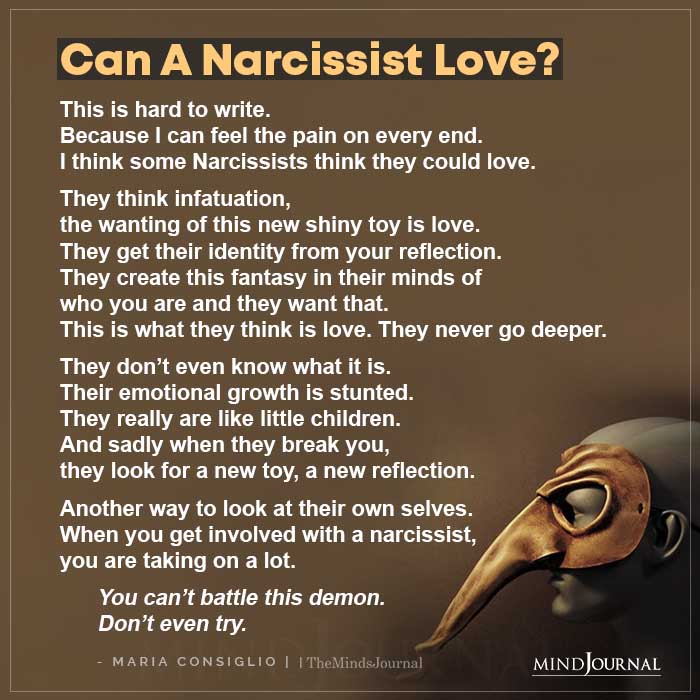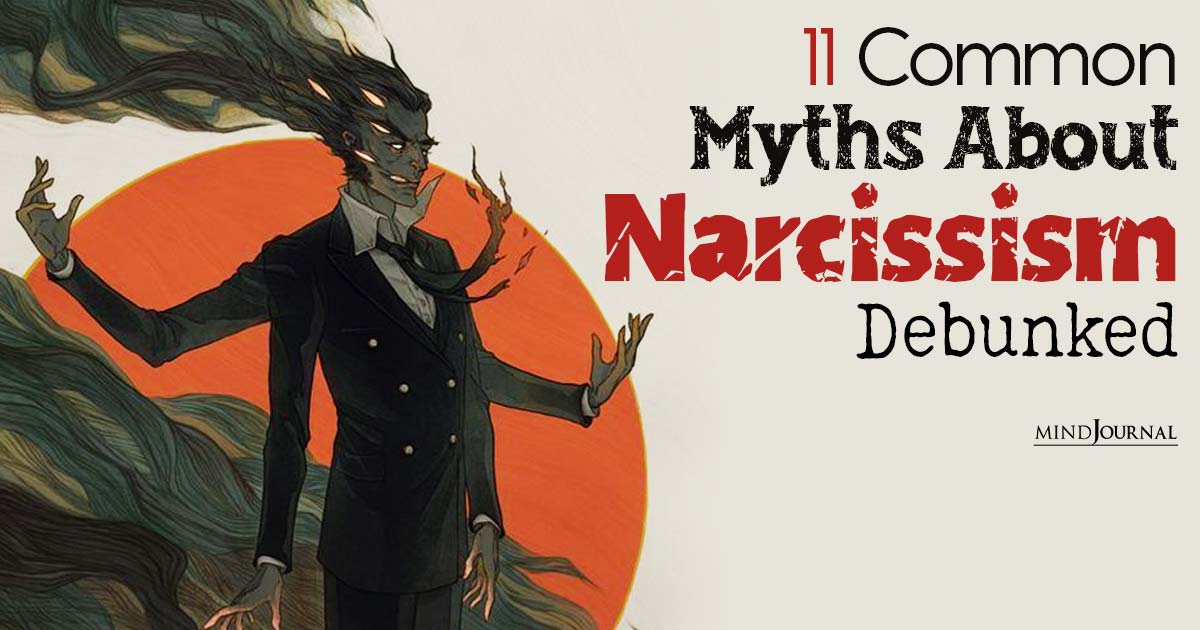We’ve all heard the term “narcissism,” but did you know there are certain myths about Narcissism? Yes, and let’s face it, it’s often wrapped in layers of misunderstanding and exaggeration. Time to untangle the misconceptions about Narcissism!
Research on narcissistic personality disorder has substantially increased in the last 20 years, and the public discourse on narcissism has exploded, but it is often inaccurate.
Many social media spokespersons (both narcissists and their victims) generalize their personal experiences to all narcissists.
As an author and licensed family therapist, my writing is evidence-based on my clinical experience and academic studies.
In order to deal effectively with narcissists, it’s essential to understand their mind and motivations.
Read more here: The Myth Of The Narcissistic Mask: What Happens When You Get To Know a Narcissist?
11 Common Myths About Narcissism
Here are some of the common misguided beliefs:
1. Narcissists are aggressive.
It’s true that narcissists are generally disagreeable. But while many narcissists are aggressive and some are malicious and vindictive, aggression is not even a criterion for narcissistic personality disorder (“NPD”) in the Diagnostic Manual of Clinical Disorders.
Most of us can lose our temper occasionally; however, the more aggressive a narcissist is, the more severe the NPD. Greater cruelty and malevolence indicate sociopathy. Sociopathic narcissists qualify for both personality disorders.
2. Narcissism is caused by bad mothering.
To explain the cause of narcissism, this was one of the theories put forth by psychoanalyst Otto Kernberg. Mothers have been unfairly blamed. It is true to some degree when a mother is cold, cruel, domineering, or invasive.
However, recent studies show that NPD is roughly about 50% inherited from a narcissistic parent, so in those cases perhaps the mother had NPD. In other cases, it may be the father’s NPD that is passed onto the child, despite normal parenting by the mother.
3. People who act narcissistically are narcissists.
Confusion in the media about narcissism has led people to conflate narcissistic traits and NPD. Some narcissism is healthy and indicates self-esteem, leadership, and self-confidence. But just because a person is selfish, arrogant, or vain and preoccupied with their appearance does not make them a narcissist.
Selfishness isn’t a criterion. Slightly different is feeling entitled, which is a symptom. It’s more than being uncharitable or focusing on your own needs; it requires that you believe you deserve special treatment.
Arrogance is only one criterion, although not a required one to make the diagnosis. Needing admiration is a trait that is required to make the diagnosis, but four more traits must also be present.
Read more here: How To Make A Narcissist Respect You: The Only Way
4. Narcissists are aware they’re behaving inappropriately.
Personality disorders are enduring starting in childhood. To narcissists, their thoughts and behavior are “normal.” They believe that other people are incorrect or at fault. They may not know that their behavior hurts people.
However, when they’re being vindictive, they intend to inflict pain. Other times, behavior that appears selfish or punishing, like withdrawal, may be intended to provide self-protection.
5. Narcissists know they have a disorder or you should tell them.
Because they’ve lived their entire life with NPD and have experienced reality through their skewed perception, they’re unaware of their problem – like a fish unaware that it’s in water.
Similarly, we take gravity for granted. Science informs us that we’d fly into space without it. Unless they’re ready to seek professional help, it is useless to try to tell a narcissist they have NPD. Moreover, they have thin skins. They’d feel attacked and criticized and would probably tell you that you’re a narcissist!
6. Explaining their errors to narcissists will change them.
For the reasons stated above, this is counterproductive. Explaining isn’t helpful. Narcissists don’t receive constructive feedback because they feel criticized. Moreover, they aren’t interested in your point of view, nor do they consider it accurate.
They only know their own experience, and that is that someone else is the problem or caused their behavior. They won’t take responsibility for their actions because of their hidden shame.
7. Narcissists have high self-esteem.
Narcissistic behavior is all a facade – a defense to their deep shame. They continuously monitor their self-esteem, require constant admiration, and distort reality to feel better about themselves. In earlier studies, examiners took narcissists’ self-reported high self-esteem at face value.
Then more astute researchers hooked up the participants to a lie detector machine. When the narcissists thought they’d be caught lying, they admitted their insecurities.
Some successful grandiose narcissists do feel good about themselves. But unlike healthy self-esteem, theirs comes crashing down when they have serious setbacks because their confidence is only skin-deep.
8. Narcissists have avoidant attachment styles.
Surprisingly, although narcissists are often uncomfortable with emotional intimacy, narcissists with greater grandiosity generally have secure attachment styles. However, the more antagonistic they are, the more insecure is their style. Many have long-term marriages.
With less grandiosity, they’re more avoidant and dismissive. In contrast, covert or vulnerable narcissists tend to have an anxious or anxious/avoidant attachment style. Beware, however, that their desire for you is still self-centered to satisfy their needs.
9. It’s helpful to tell narcissists your feelings.
Although some narcissists with milder NPD can listen to your feelings, in most cases, narcissists aren’t interested in your feelings. They have disdain for vulnerable feelings, such as hurt, loneliness, fear, shame, and grief.
Showing them your pain may be a turn-off. Depending upon how you communicate, they might also feel blamed and shamed by your feelings and react with rage or more blame. If they do listen, and even in the rare cases where they apologize, it doesn’t mean that their behavior will change.
It’s better to set boundaries, focus on what you’d like them to do, and incentivize the new changed behavior. There are scripts and steps outlining how to do this in Dating, Loving, and Leaving a Narcissist: Essential Tools for Improving or Leaving Narcissistic and Abusive Relationships.
10. Narcissists would change if they wanted to (or if they cared enough about you or their children).
Because NPD is enduring from childhood and affects their thinking, perceptions, feelings, and behavior, they cannot see the world or their behavior differently from how they’ve always been. They don’t even see others as whole, separate people, but just as two-dimensional cardboard figures in their life. Don’t expect them to perceive or act as you do.

They don’t understand the connection between their actions and their impact on other people, nor why other people respond to them the way that they do. They lack “theory of mind,” meaning that they cannot understand and take into account your mental state or how other people think – except to a limited extent to manipulate them.
11. Narcissism is unalterable. Therapy is pointless.
This is commonly repeated in social media; however, it’s untrue. In many cases, narcissists benefit from therapy. If they commit to treatment, they can substantially improve by working with an experienced psychotherapist familiar with NPD.
However, it’s difficult to get a narcissist to attend therapy and commit to long-term treatment because they don’t believe that they have a problem. There must be a significant incentive, such as a major loss or repeated setbacks to motivate them.
Individuals with more severe NPD are less likely to attend and benefit from psychotherapy.
You can improve a relationship with a narcissist by deeply understanding their thinking and motivations and by changing the way you interact with them.
By doing the exercises and following the steps in Dating, Loving, and Leaving a Narcissist: Essential Tools for Improving or Leaving Narcissistic and Abusive Relationships you can stop reacting to them and start living your life more autonomously and assertively.
You will also be able to determine whether or not your relationship can improve. Either way, you’ll be empowered to stay or leave.
© 2023 Darlene Lancer
Read more here: 7 Things Narcissists Say To Excuse Their Behavior And Keep You Under Control
These were some of the myths about narcissistic personality disorder. Do you think narcissists feel they are misunderstood? Share your thoughts in the comments below!
Written by: Darlene Lancer, JD, LMFT Originally appeared on: whatiscodependency
Frequently Asked Questions (FAQs)
What can be confused with narcissistic personality disorder?
One of the myths about narcissism is that it’s always easy to spot traits like confidence and self-assuredness with narcissistic personality disorder, leading to misconceptions and misjudgments.
What are some common myths about narcissists?
Some of the common misconceptions about narcissism often paint them as solely obsessed with their looks, but in reality, their self-centeredness goes beyond appearances.
Are narcissists misunderstood?
One of the popular myths about narcissism is that their actions are purely intentional. However, the truth lies deeper: pathological narcissism isn’t just an overblown sense of self-importance; it’s a profound psychological disorder.











Leave a Reply